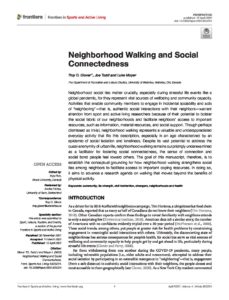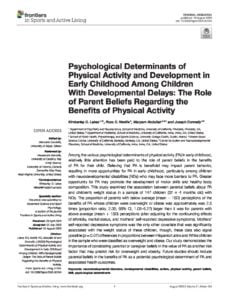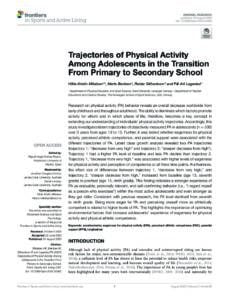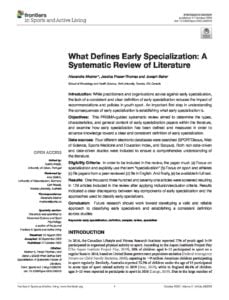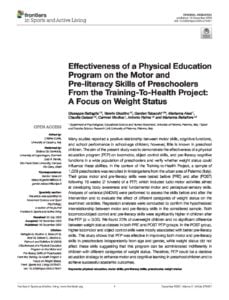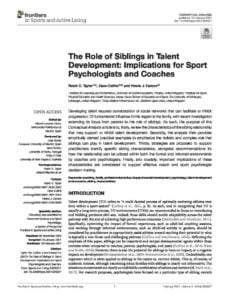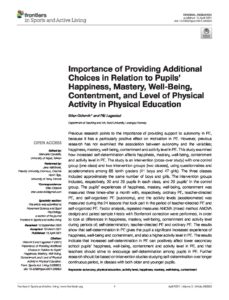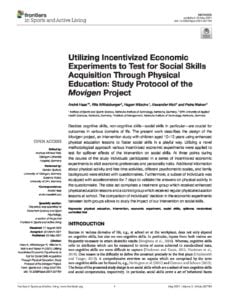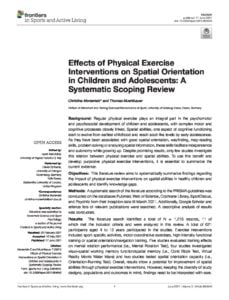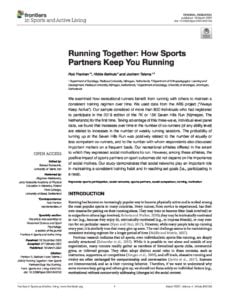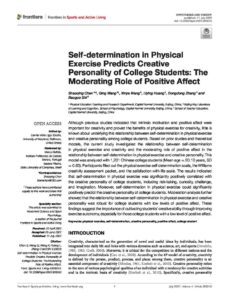-
Neighbourhood Walking and Social Connectedness
Abstract Neighborhood social ties matter crucially, especially during stressful life events like a global pandemic, for they represent vital sources of wellbeing and community capacity.… -
Psychological Determinants of Physical Activity and Development in Early Childhood Among Children With Developmental Delays: The Role of Parent Beliefs Regarding the Benefits of Physical Activity
Abstract Among the various psychological determinants of physical activity (PA) in early childhood, relatively little attention has been paid to the role of parent beliefs… -
Trajectories of Physical Activity Among Adolescents in the Transition From Primary to Secondary School
Abstract Research on physical activity (PA) behaviour reveals an overall decrease worldwide from early childhood and throughout adulthood. The ability to illuminate which factors promote… -
What Defines Early Specialization: A Systematic Review of Literature
Abstract Introduction: While practitioners and organizations advise against early specialization, the lack of a consistent and clear definition of early specialization reduces the impact of recommendations… -
Effectiveness of a Physical Education Program on the Motor and Pre-literacy Skills of Preschoolers From the Training-To-Health Project: A Focus on Weight Status
Abstract Many studies reported a positive relationship between motor skills, cognitive functions, and school performance in school-age children; however, little is known in preschool children.… -
The Role of Siblings in Talent Development: Implications for Sport Psychologists and Coaches
Abstract Developing talent requires consideration of social networks that can facilitate or inhibit progression. Of fundamental influence in this regard is the family, with recent… -
Importance of Providing Additional Choices in Relation to Pupils’ Happiness, Mastery, Well-Being, Contentment, and Level of Physical Activity in Physical Education
Abstract Previous research points to the importance of providing support to autonomy in PE, because it has a particularly positive effect on motivation in PE.… -
Utilizing Incentivized Economic Experiments to Test for Social Skills Acquisition Through Physical Education: Study Protocol of the Movigen Project
Abstract Besides cognitive skills, non-cognitive skills—social skills in particular—are crucial for outcomes in various domains of life. The present work describes the design of the Movigen project,… -
Effects of Physical Exercise Interventions on Spatial Orientation in Children and Adolescents: A Systematic Scoping Review
Abstract Background: Regular physical exercise plays an integral part in the psychomotor and psychosocial development of children and adolescents, with complex motor and cognitive processes closely… -
Using digital technology to enhance student engagement in physical education
Abstract This paper explored the use of video technology as an aid to student engagement in physical education. Working in a comprehensive high school in… -
Running Together: How Sports Partners Keep You Running
Abstract We examined how recreational runners benefit from running with others to maintain a consistent training regimen over time. We used data from the ABS… -
Self-determination in Physical Exercise Predicts Creative Personality of College Students: The Moderating Role of Positive Affect
Abstract Although previous studies indicated that intrinsic motivation and positive affect were important for creativity and proved the benefits of physical exercise for creativity, little…


